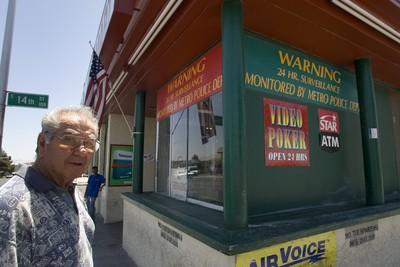LV police to post cameras

If you find yourself at Fremont and 15th streets in downtown Las Vegas in the coming weeks, make sure to smile: Chances are you’re going to be on a Metropolitan Police Department surveillance camera.
Starting in August, Las Vegas police will place surveillance cameras at that intersection. Police are touting the three-month pilot project as a way to crack down on drug dealing, assaults and robberies in a high-crime area.
If it’s successful, the department may expand surveillance to other valley neighborhoods.
“Everyone would support putting a police officer on every corner in a high-crime area, but we can’t afford to do that,” said Las Vegas police Deputy Chief Gary Schofield. “The next best thing is to have one police officer watch multiple corners in a high-crime area.”
The American Civil Liberties Union of Nevada, however, sees the surveillance cameras as a “shortcut” for police. Gary Peck, executive director of the ACLU of Nevada, said the cameras will invade privacy and only move crime to other areas.
“One of the hallmarks of society is that you have the right to be left alone. These cameras will change the nature of public space,” Peck said. “When you know there are cameras watching your every move, it changes the way you experience being in public.”
Las Vegas police Lt. Gawain Guedry said Thursday that the cameras will be placed in a bulletproof box with a strobe light on top to alert people to the cameras.
The cameras will be able to pan, tilt and zoom. Police probably will keep recordings of the cameras’ images for three to seven days.
“You can look at it like having a virtual police officer,” Guedry said. “They can determine if a crime occurs, and the cameras can be on the scene as it (crime) happens, faster than a cruiser.”
Police haven’t determined how much the system will cost.
The department chose three vendors to test out the cameras for 30 days each. Those companies are: RMS Technology Solutions of Buffalo Grove, Ill.; SecureCore of Rockford, Ill.; and ESi Companies Inc. of Memphis, Tenn.
Guedry said he traveled to Chicago to check out the Chicago Police Department’s surveillance program and was impressed with their 500-plus cameras.
Guedry said he went to a Chicago neighborhood with officers to replace a camera with a newer model. While the police were working, a woman who lived nearby came out and screamed at the officers to leave the camera where it was.
“They told her they were only replacing the camera. She said, ‘Thank God,’ ” Guedry said.
The ACLU is skeptical that cameras will decrease crime in the valley. Peck urged police to abandon the cameras for community policing programs that “build bridges to the community instead of barriers.”
Peck fears police will target people in a discriminatory way and use the cameras to pry into innocent citizens’ lives, he said.
“History tells us that once you have these systems in place, they are often abused in a myriad of ways,” Peck said.
Surveillance cameras are a fact of life in Southern Nevada. Casinos are well-known for their heavy surveillance, and many other businesses, such as convenience stores, are outfitted with cameras.
But Lee Rowland, staff attorney for the ACLU of Nevada, said people can choose not to go into a casino but can’t avoid a camera that is outside their front door.
“We’re moving more toward universal surveillance without knowing if it actually works,” she said.
According to a U.S. Department of Justice report, surveillance cameras have been effective in reducing crime in some areas.
In King’s Lynn, in the United Kingdom, burglary was reduced and vehicle crimes decreased from 1987 to 1994 in areas where closed-circuit television cameras were used.
However, other areas, such as Greater Easterhouse in Glasgow, Scotland, saw no overall crime reduction when cameras were used, the report stated.
In fact, the report stated that some crime increased, although at a slower rate than in areas without cameras.
Although the Nevada Legislature hasn’t barred surveillance cameras, it has banned the use of red light cameras to ticket motorists. Legislators in the past have said such cameras are an invasion of privacy.
However, some legislators who have opposed red light cameras said they don’t oppose a police surveillance camera program.
“If it’s (the camera) well-posted, then some of the Fourth Amendment concerns are not as serious,” said state Sen. Mike McGinness, R-Fallon, who opposed red light cameras. “As long as there are signs notifying the public that the cameras are in use, I think the public can act accordingly.”
Some downtown business owners and residents favor the idea.
The Rev. Steven Smith, a downtown booster, said he and others in the Downtown Business Owners Council considered using their own video cameras to take footage of wrongdoing and post it on the Internet.
“It’s a great thing. You have ladies with babies who have to go to the 7-Eleven across the way (on Fremont and 15th). They shouldn’t have to be preyed upon by gang members,” he said.
Ronda Simmons, who lives at the South Cove apartments on the corner of 15th and Fremont, supported the cameras as well. She said there is often drug dealing and robberies at the intersection. She said she believes the camera would scare off the criminals.
“We need it around here,” she said.